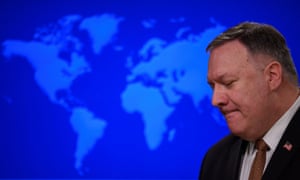Mike Pompeo and Mark Esper agreed to proceed with US withdrawal of Open Skies Treaty despite pandemic, sources say

Photograph: Reuters
The Trump administration is determined to withdraw from a 28-year-old treaty intended to reduce the risk of an accidental war between the west and Russia by allowing reconnaissance flights over each other’s territory.
Despite the coronavirus pandemic, which has put off a full national security council (NSC) meeting on the Open Skies Treaty (OST), the secretary of defence, Mark Esper, and secretary of state, Mike Pompeo, have agreed to proceed with a US exit, according to two sources familiar with administration planning.
A statement of intent is expected soon, with a formal notification of withdrawal issued a few months later, possibly at the end of the fiscal year in September. The US would cease to be a party to the treaty six months after that, so if a new president were elected in November, the decision could be reversed before taking effect.
Because of the Covid-19 pandemic, reconnaissance flights under the treaty have been suspended until 26 April.
The US has complained about what it says are Russian infringements of the treaty, which was signed in 1992 and has been in force since 2002: limitations on flights over the Baltic enclave of Kaliningrad to less than 500km and the creation of an exclusion corridor along the border of the Russian-occupied regions of South Ossetia and Abkhazia.
Russia imposed the limitation over Kaliningrad after a prolonged zigzagging Polish overflight in 2014 closed down aviation for a day. Russia allowed an extended flight over Kaliningrad in February.
One of the reasons Esper has cited for US withdrawal is to save money by not replacing the two Boeing OC-135B planes the US uses for its Open Skies reconnaissance flights.
Congress appropriated $41.5m last year for the cost of replacement but the Pentagon spending request published in February contained no budget for the new planes. Esper told Congress he was awaiting a decision from the president.
Three Republican hawks in the Senate, Richard Burr, Tom Cotton and Ted Cruz, sent a letter to the administration in March calling for withdrawal, for cost and security reasons.
“The costs of the OST go far beyond wasteful spending, and directly erode our national security by enabling Russian espionage over the United States,” the senators wrote.
Supporters of the Open Skies Treaty say the US and its allies benefit from it more than Russia, with three times more overflights of Russian territory than Russia flights over US and allied territory.
Furthermore, US withdrawal would not stop Russian reconnaissance flights over US bases in Europe.
“The administration has yet to put forward any proposals on how to fix the two main issues that we’re having with the treaty, and our allies have reiterated again and again, that they do not want us to leave the treaty,” said Alexandra Bell, a former state department arms control official and now senior policy director at the Center for Arms Control and Non-Proliferation. “The administration doesn’t seem to have any plan of what to do about US bases in Europe.”
The Democratic senators Bob Menendez and Jack Reed wrote to the administration in February, saying: “The Open Skies Treaty is an important multilateral agreement that operates as a critical transparency tool for the United States and our allied treaty partners. It provides the United States and our partners real-time, comprehensive images of Russian military facilities.
“If this administration moves forward with a precipitous unilateral withdrawal from the treaty the United States will be less safe and secure,”
Last year, the US set out questionnaires to its allies about their views on the treaty’s value. The UK and other Europeans sent emphatic appeals for the US to remain part of the agreement. Ukraine also publicly underlined the strategic importance it attaches to the treaty. But the administration has so far not shared the result of its survey with Congress.
The NSC was due to conduct a “principals meeting” of top administration officials in February to discuss two options: immediate announcement of withdrawal, or a period of a few months consultation with allies pending a final decision, as a final warning to Russia.
The principals meeting was put off until 11 March and then postponed again, in the face of the pandemic. But the absence of an NSC discussion does not appear to have stopped the momentum for US withdrawal.
The Open Skies Treaty is the latest arms control agreement to be targeted by the Trump administration, which has walked out of the 2015 nuclear deal with Iran and the Intermediate-range Nuclear Forces (INF) treaty with Russia.
Daryl Kimball, executive director of the Arms Control Association, said: “At a time when the need for international cooperation, couldn’t be any more obvious, with respect to dealing with the coronavirus pandemic, it is foreign policy malpractice for the Donald J Trump administration to withdraw from a treaty that has been in effect for nearly 30 years against the wishes of the United States closest allies in Europe.”



